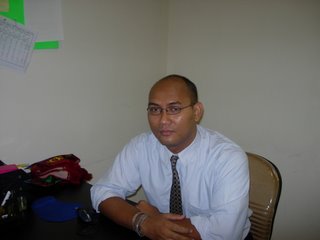
What is the line between law enforcement and torture? This is basically the current debate between relatives, lawyers, priests, friends and supporters of the three Flores villagers, Tibo, Riwu and da Silva, who were executed last Thursday at midnight, and the Indonesian authorities.
More specifically this is a question for those defending the human and legal rights of the Flores trio and the Indonesian Police, whose Mobile Brigade (Brimob) members carried out the execution.The state had insisted on taking over the burial of the deceased in secrecy, without involving their families, who were not allowed to pay their last respects properly, with the proper religious rites. This violation of Law No. 2/1964 which stipulates the procedures for carrying out the death penalty triggered the mass protests in Atambua, West Timor and Maumere, Flores, apart from the fact that they were wrongly sentenced by the Indonesian judiciary in the first place. So, blaming local activists for the Atambua and Maumere riots, as the police have done is wrong.
Peace and reconciliation can only be achieved, if the security authorities -- the police and military -- begin by admitting their own mistakes. After this storm calmed down (more for fear of security repercussions than anything else), a new storm raged. Not on the streets of East Nusa Tenggara or Central Sulawesi, but in the media. What is at issue here is the manner in which the executions had been carried out, which, many believe, had been excessive. This storm began with rumors that the three convicts had been tortured before the execution, on the way to face execution at the Police Mobile Brigade (Brimob) barracks, south of the city of Palu. Are these rumors unfounded? Yes and no. Yes, according to the police commanders, who have persistently stated, that the execution was carried out in accordance with all the procedures stipulated in Law No. 2/1964. No, according to lawyers associated with PADMA Indonesia, the legal aid group which had supported Tibo, Riwu, and da Silva during their last years in prison. The most sensitive matter has been the state of the bodies of the Flores trio, whose friends and relatives discovered, when the body of one of the trio, Dominggus da Silva, was exhumed to be prepared for the requiem mass in Palu, before being flown back to Maumere, Flores, as had been the dead man's wish. The discovery of multiple shotgun wounds in and around his heart triggered the protests against the state security apparatus. Consequently, when the bodies of Fabianus Tibo and Marinus Riwu were inspected by the state physician in Beteleme, near the hometowns of Tibo and Riwu's wives, a similar discovery was made. The bodies of both men showed multiple shotgun wounds in their chests, as well as in their backs, where the bullets may have exited.
This discovery further fueled the belief that the actions of the executors were excessive. However, the police commanders insist that the convicts were not tortured before the execution. The three death squads who had carried out the executions, which consisted of 12 Brimob members each, had carried out their duties as stipulated by the Standard Operating Procedures issued by the Police Headquarters in Jakarta. So, why were there so many wounds in the chests and backs of the Flores trio? Here is where the controversy began. Most human rights activists -- including those within the police force -- believed that the previous SOP, which stipulates that only one live bullet shall be used to kill the condemned convict, was still in force. If the person is still alive, then the death squad commander has to use his own pistol to end the life of the person with one shot to the brain. This, unfortunately, is not the case now. A new SOP from the National Police Headquarters in Jakarta, issued in July 2004, stipulates that half of the 12 shooters have live rounds in their rifles, while the other half only receive blanks. Understandably, simultaneous shots by six bullets from a distance of less than 10 meters, may have caused other injuries to Tibo, Riwu and da Silva's bodies, such as broken ribs, due to the impact of those multiple shots.
With this new police regulation, the trend toward more humane executions in Indonesia, with the abolition of hanging in public (see Article 11 of the Indonesian Criminal Code) to shooting in secret locations, has been reversed. This reversal may has something to do with George W. Bush's war against terror, which has been religiously followed by the Indonesian security authorities since the Bali bombings. This reversal is even more deplorable, since the International Convention Against Torture and Other Cruel, Inhuman and Degrading Treatment or Punishment has been ratified by the legislature and then president B.J. Habibie on Nov. 23, 2000. Therefore, I strongly recommend that this inhumane regulation be reviewed by the Constitutional Court in Indonesia. Or, the police themselves should revoke this regulation. In fact, the death penalty should be abolished, because of its inconsistency with all the international human rights instruments which Indonesia has ratified. As far as the execution of Tibo, Riwu, and da Silva is concerned, I personally recommend that these human rights violations be brought to the Indonesian Human Rights Court.
If that avenue is blocked, for whatever reason, then the case should be taken to the UN Human Rights Commission in Geneva. Last but certainly not least, as has been repeatedly stated by my colleagues from the Tanah Merdeka Foundation and the Poso Center, the criminal, illegal, and inhuman execution of the Flores trio should not halt the investigation of the individuals and institutions responsible for the ongoing unrest and violence in Poso. This investigation should be entrusted to an independent investigating body, coordinated by those whose hands have not been tainted by the blood of Tibo, Riwu, da Silva, and the thousands of victims of the communal and state-endorsed violence in this region.
Comments